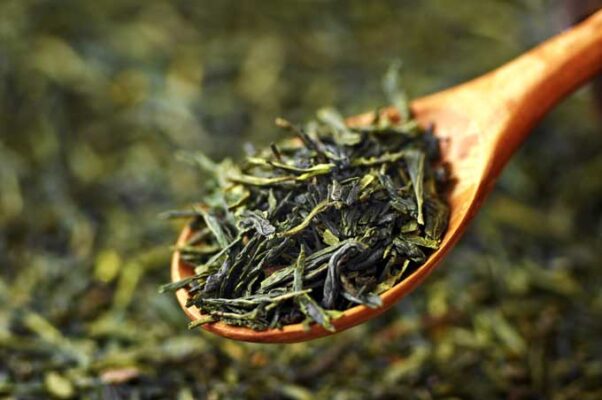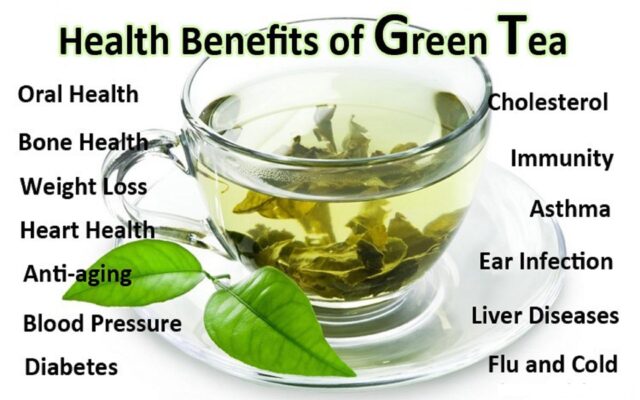Incredible Benefits Of Green Tea
Many people start their day with a steaming cup of coffee. But did you know that a cup of green tea comes with a ton of benefits?
Making the switch to green tea, or at least changing up the routine to include green tea in your daily regimen of liquids, is a smart idea. There’s a whole lotta good in that cup of tea, including its fat-burning properties and ability to improve brain function.
WHAT IS GREEN TEA?
To best understand green tea, we have to look at tea in general. Most people drink black tea or variations of it. Others like to sip on oolong tea, and some people prefer the white variety of tea. What are the differences, and what makes green tea so healthy? Tea comes from the leaves of the Camellia Sinensis bush. The plant comes in two varieties. One grows in China and is used for green and white teas. The second type of bush is found in India and is used for both oolong and black tea.
Of the four types of tea, green tea has the most flavonoids, which are plant-based antioxidant chemicals. Green tea is the least oxidized when processed, and that is why it is touted as the most beneficial.

HOW MUCH GREEN TEA SHOULD YOU DRINK A DAY?
Studies have not been conclusive on how much green tea to drink a day to reap the maximum benefit. It really depends on the person and their own personal health. Different amounts of green tea every day will benefit you in various ways. But, we have to look at it this way – how much you consume depends on how much you can tolerate. Not everyone wants to drink 5 cups in 24 hours. Adding green tea to your diet is beneficial, but as long as you are drinking a cup or more a day, that’s great!
HOW MUCH CAFFEINE IS IN GREEN TEA?
The amount of caffeine in a cup of green tea will depend on how it was grown and processed and how you brew it. But according to the Mayo Clinic, an 8 oz cup of green tea has about 28 mg of caffeine. This is about half of what you’d find in a cup of black tea.

CAN I DRINK GREEN TEA ON AN EMPTY STOMACH?
Despite the benefits of green tea, it’s best to not drink it on an empty stomach. Doing so can cause you to experience nausea. It’s the tannins in the tea that cause the problems. Tannins can increase stomach acids, leading you to feel sick and even have a stomach ache. It’s best to drink green tea in between meals. Don’t drink green tea with your meal, as it could interfere with iron intake.
ARE THERE SIDE EFFECTS TO DRINKING GREEN TEA?
People who drink a lot of green tea may experience side effects. If this happens, it’s a good idea to cut back. Don’t go all out the first day. Moderation is always ideal.
- Like with any caffeine, too much can make you jittery
- Excessive caffeine can affect sleep
- Dehydration can occur if you drink in excess because tea is a diuretic
- Too much green tea can cause headaches
- Some people may experience stomach upset
- Iron deficient people should drink green tea one hour after meals or in between meals because it may affect iron absorption.

HOW TO DRINK GREEN TEA
Did you know that green tea is the second most consumed beverage after water? Who knew? Enjoy green tea warm or cold, but when you brew it, don’t pour boiling water over the leaves immediately after it has boiled. Doing so will affect the potent catechins that do all the work. Let the boiling water rest about 10 minutes and then pour. Steep 1 to 5 minutes, depending on your taste.
BENEFITS OF GREEN TEA
1. Improves brain functioning
One of the main ingredients in green tea is caffeine. Caffeine can block a chemical messenger in the brain called adenosine, which controls when you feel sleepy or awake. Blocking adenosine can prevent drowsiness, which is why so many people use caffeine to stay awake and mentally sharp. An overproduction of adenosine in the brain has also been linked to cognitive conditions like Alzheimer’s and Parkinson’s. Research shows that regular consumption of caffeine may reduce the risk of developing these conditions.
The amount of caffeine in green tea is much lower than in coffee, so you can get some of the benefits of caffeine without the unpleasant side effects, like jitteriness. Green tea also contains an amino acid called L-theanine, which has been found to help reduce stress and boost your mood. Research shows that the combination of caffeine and L-theanine improves brain function by strengthening working memory and attention and reducing anxiety.
2. Keeps your heart healthy
Green tea has been found to play a role in heart health by reducing the risk factors that cause heart disease. High blood pressure is one of the most common risk factors for heart disease. Research shows that consuming green tea significantly lowers systolic and diastolic blood pressure, which are the two different numbers by which a person’s blood pressure is recorded.
3. Lowers cholesterol
Catechin is a major component of green tea. Catechins are natural antioxidants that have antioxidative, anti-inflammatory, and anti-hypertensive effects. They lower cholesterol levels by decreasing the absorption of cholesterol into the body. A 2011 analysis of 14 studies showed that drinking an average of two cups of green tea per day for 10 years resulted in significant reductions in LDL cholesterol levels. LDL cholesterol is also known as bad cholesterol because it can cause plaque buildup in your arteries, which increases your risk of getting a heart attack or a stroke.
4. Strengthens bones
Green tea also helps to keep your bones healthy and strong. Research shows that it may help treat and prevent osteoporosis, a condition that makes your bones weaker and more prone to fractures. “Tea leaves contain fluoride, which might slow osteoporosis, as well as beneficial compounds such as flavonoids and phytoestrogens,” Ring says. Flavonoids are and phytoestrogens are plant chemicals that can strengthen bone formation and prevent the breakdown of bone tissue.
5. Prevents skin aging
Drinking green tea — or using it topically — has many benefits for your skin. Green tea contains a micronutrient called epigallocatechin gallate (EGCG) that may be responsible for green tea’s skin repair properties. Some research shows that EGCG contains antioxidants, which help to prevent sun damage. It also boosts skin hydration, moisture retention, and prevents wrinkle formation.
Share This:



